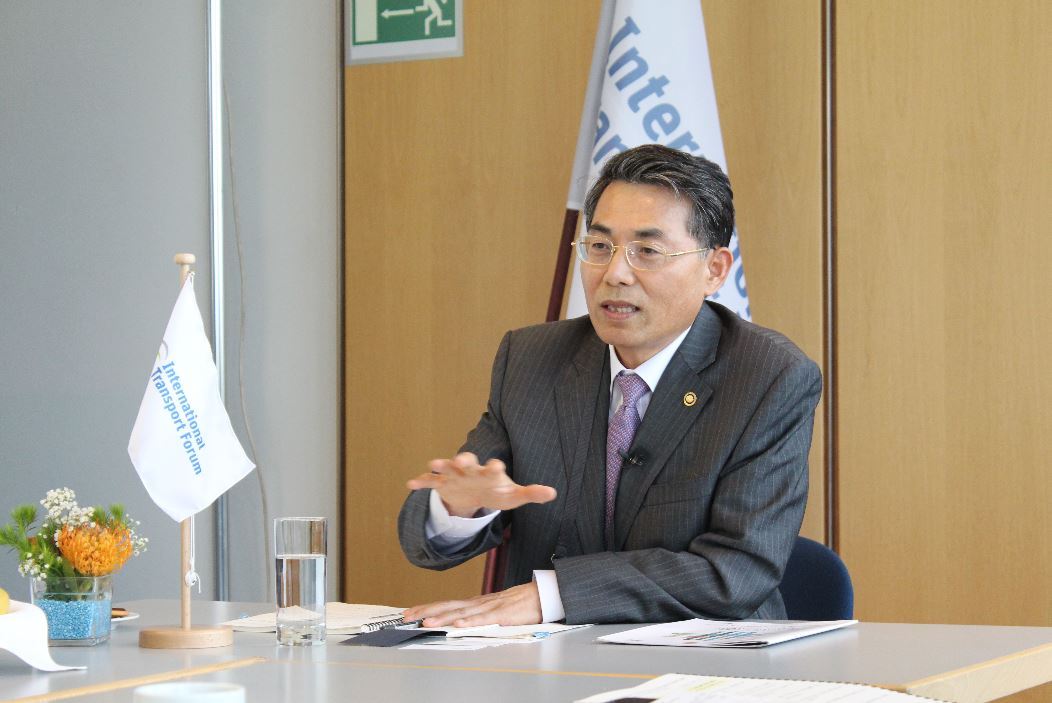Vice transport minister opposes market entry of Uber
Top official refutes criticism of government being swayed by labor unions, ministry remains committed to inter-Korean railway reconnection
By Cho Chung-unPublished : May 23, 2019 - 14:37
LEIPZIG, Germany -- Citing the role of taxis in Korea as a form of quasi-public transport, South Korea’s vice transport minister said Wednesday that he “disagrees” with the idea of global ride-hailing services like Uber and Lyft entering the local market.
In an interview with Korean reporters covering the International Transport Forum in German city of Leipzig, Kim Jeong-ryeol, the second vice minister of transport, land and infrastructure, said that the Korean government was working on modernizing the existing taxi industry by improving their pay systems and adopting technological platforms applicable for cabs owned by private companies and individuals. He says this would be a better option than permitting the operation of Uber and Lyft in South Korea, according to him.
“It is still difficult to agree with the operations of Uber in South Korea because it is about offering transport services with privately owned vehicles (for non-commercial use),” Kim said.
In an interview with Korean reporters covering the International Transport Forum in German city of Leipzig, Kim Jeong-ryeol, the second vice minister of transport, land and infrastructure, said that the Korean government was working on modernizing the existing taxi industry by improving their pay systems and adopting technological platforms applicable for cabs owned by private companies and individuals. He says this would be a better option than permitting the operation of Uber and Lyft in South Korea, according to him.
“It is still difficult to agree with the operations of Uber in South Korea because it is about offering transport services with privately owned vehicles (for non-commercial use),” Kim said.

“It is important to adopt innovative businesses here, but we really need to think of the 290,000 taxi drivers and their jobs being pushed away.”
Pointing to South Korea’s low taxi rates compared to US and other advanced markets, the vice minister said Uber would not have competitive edge in the market, even if they make entry.
Advanced information technology and the rise of mobility services have been pushing Korea’s taxi industry to embrace change, but drivers have been resisting furiously.
Two taxi drivers killed themselves late last year, in protest against a planned carpooling service backed by the government’s push to nurture innovative technology services. Hundreds of taxi drivers had staged a series of sit-in protests. Most recently earlier this month, another taxi driver set fire to himself in protest against another driving service Tada. He later died.
The Moon Jae-in government, stuck between its pledge to nurture innovative technologies and protection of workers, has been seeking to create a consultative body to resolve the standoffs, such as by organizing a compromise between Kakao Mobility and the taxi industry in March.
The ministry has also been facing a dilemma over the nation’s bus drivers’ demands for wage increases and improved working conditions. The drivers have threatened to conduct a nationwide strike, which would cause traffic chaos for the country highly dependent on public transportation.
When asked of criticism over the ministry being swayed by bus and taxi drivers threatening to stage nationwide strikes, Kim denied this. He said that the plans to raise bus fares and reduce drivers’ work hours were aimed at securing public safety and improving work conditions, not a response to pressure from drivers. Unionized bus drivers in Seoul, Busan and all other metropolitan cities and provinces canceled a planned strike last week, after Transport Minister Kim Hyun-mee offered a package of indirect financial incentives and bus fare increases.
“Public transportation fares have been fixed relatively lower than other countries and it is, of course, right to keep the fare price low for the sake of public benefit. But we can’t always restrict price increases,” he said.
The vice minister was attending the annual ITF summit in place of Minister Kim, who has been facing pressure following possible strikes by bus drivers and controversy over the government’s plan to build new satellite cities.
South Korea holds the presidency of this year’s summit, dubbed as Davos of Transport. Korea is the second Asian country to hold the presidency of the summit that has 59 member countries. The focus of the summit has been transport connectivity for regional integration aimed at bringing balanced development around the world.
On inter-Korean railways, for which the ministry has been taking the lead, Kim said that despite stalled talks on denuclearization of North Korea, the project must go on not only for sake of building peace on the Korean Peninsula and the surrounding region.
The ministry has been conducting joint study on North Korean railroad and system, mostly exchanging data and information within the boundaries international sanctions on Pyongyang.
The vice minister noted keen interest in the project from neighboring countries, particularly Russia. The ministry has been seeking ways to dispense financial risks of reconnecting railways, such as by facilitating international funds like the Asian Development Bank or the Asian Infrastructure Investment Bank, he said.
By Cho Chung-un, Korea Herald correspondent
(christory@heraldcorp.com)

















![[KH Explains] Hyundai's full hybrid edge to pay off amid slow transition to pure EVs](http://res.heraldm.com/phpwas/restmb_idxmake.php?idx=652&simg=/content/image/2024/04/18/20240418050645_0.jpg&u=20240418181020)

![[Today’s K-pop] Zico drops snippet of collaboration with Jennie](http://res.heraldm.com/phpwas/restmb_idxmake.php?idx=642&simg=/content/image/2024/04/18/20240418050702_0.jpg&u=)